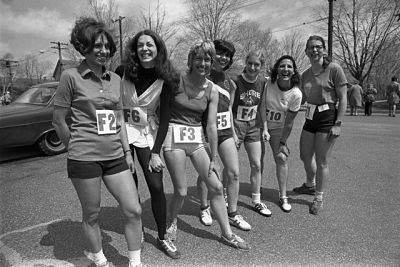Can anyone run a marathon?
You might be surprised at the variety of shapes, sizes and ages of people who cross the finish line.
Since the sport of distance running half and full marathons took off in the late 1970s, the field of participants has swollen in numbers and variety.

Some of the female runners in a 1972 race - Image © Bettmann/CORBIS
------
I’m telling ya, we aren’t all spring chickens with the coveted long-twitch fibre muscles admiring our lycra-clad physiques reflected in store windows as we glide by.
Think instead of a Clydesdale with blinders.
Sure there’s pain, sure there’s sacrifice and suffering, but there is also the crazy peaks of success.
In a recent documentary, NOVA asked where does the ability to endure come from? What is the physiological difference between someone who can run 26 miles and those watching on the sidelines?
They set out to see if they could transform 12 sedentary regular people over nine months into runners for the Boston Marathon. They included a 41-year-old hospital administrator who’s 70 pounds over weight, another woman grieving her mother who died in hit and run accident, an entrepreneur, 37, who is just generally too busy and a 60-year-old teacher.
They had the help of three-time Boston winner Uta Pippig but they still had to do the work.
The training started with measuring each of their body’s ability to extract and use oxygen – a measurement of cardio vascular fitness familiar to semi-serious recreation runners.
To run, our bodies burn and consume oxygen at the cellular level. Large amounts of oxygenated blood moves from the lungs through the veins then capillaries to the muscles where the energy is produced. How well all of that system works makes an impact on our running.
And here is where things start to become unfair.
Remember the 37-year-old entrepreneur? He’s recently divorced, has five kids, doesn’t show up for the scheduled runs but he’s got a VO2 max rating like a professional hockey player.
Just as I suspected, some performance is hereditary. I’ve got my dad’s nose, which can help in a photo finish but that’s about all. And I’d have to be a contender at the finish line, which isn’t going to happen.
Here’s the good news. After nine weeks, the beginner runners had hearts that were more efficient, filling up faster between beats, pumping with less energy. Arteries and veins were more elastic, capillaries were more plentiful and the bodies had produced more mitochondria, the powerhouses in muscle cells that produce the energy.
A few extra mitochondria does not make a marathoner but I'll take progress where I can find it.
My marathon journey
Week 2: Skipped the group Saturday long run due to family commitment in Port Alberni. Ran solo on Sunday. (I’m not genetically blessed or a professional hockey player). Target total mileage – 26 km. Week’s total 22 km. No injuries. Yet.
Tune of the week:
Start me up training with a flashback to 1981 when marathons were just starting to gain popularity and apparently Mick Jagger needed someone to him those white pants are not cool, not then, not now.
My Marathon Journey
Week 1 - Buckle up for a Bumpy Summer Ride


